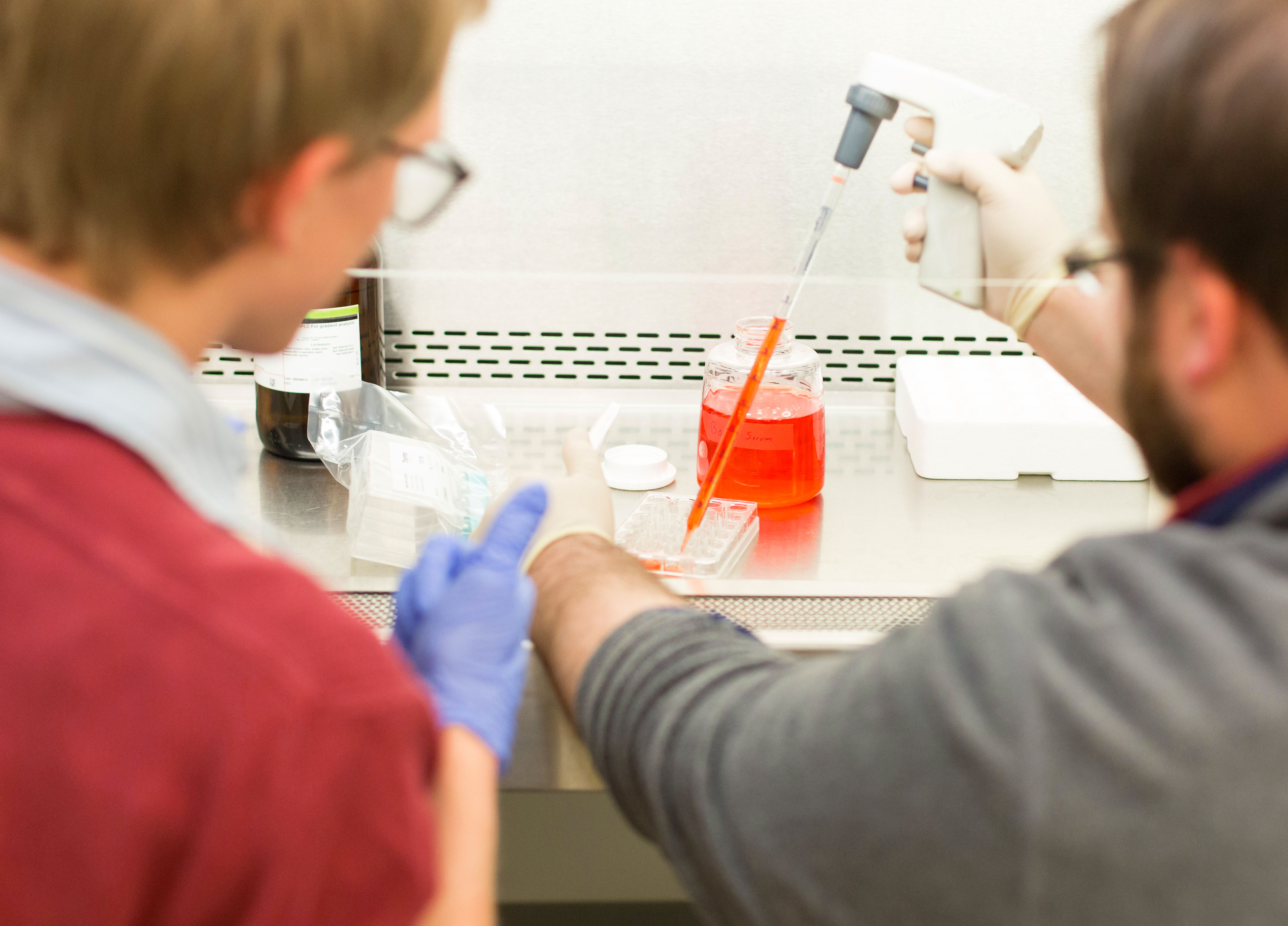Life science labs come in many varieties. Some are small with just a couple people and some are very large. According to Nature, the ideal number of members in a lab is 10 to 15. While this number of people has been determined to be great for productivity, it can often be difficult for everyone to get to know each other and come together to work as a team—especially if there is significant turnover of employees. As a lab manager, it is your job to keep everyone working together and motivated, and here we will discuss the best ways for you to successfully fulfill this role.

Lab Philosophy or Mission
In order for your team to be successful, it is essential that you lay out what your goals are and what the overall mission of the lab is. When you give a purpose to what you are doing and identify certain values that are important to your lab as a whole, everyone on the team will be better able to strive for fulfilling the lab’s philosophy. Without some type of mission explaining the overarching purpose and motivation behind the work you are doing, it will be hard for your team to understand why they are there and why their work matters. When this is present, they can easily identify how their work is contributing to the field and how it will make a difference long-term.
|
|
||
Lay Out Attainable Objectives
Along with forming a mission statement, your lab should lay out obtainable objectives for each project it takes on. Typically, objectives are essential to forming the problem and hypothesis that your research project plans to address; however, they should be slightly more in depth and detailed than just stating what questions your project seeks to answer.
For example, the goals you lay out for your team may have ideal durations that each phase of the research should take and certain standards that you would like to uphold throughout the investigation process. Remember, these should be reachable and reasonable in order to be motivational. If you’re considering using stricter objectives to increase productivity, remember that having goals which are impossible to meet will bring your team down, rather than encouraging them.
|
|
||
Show Appreciation
When your team performs well and meets the goals you have set together, show them your appreciation. There are a variety of ways to do this, but you don’t have to do anything elaborate. Simply acknowledging that they did a great job and saying thank you for their hard work can go a long way in encouraging them to keep performing at their best level. If something goes particularly well and you want to go above a simple thank you to show your appreciation, get creative with your gratitude. Bring in a homemade dessert one day or order lunch in for your team. Letting people know that their work is appreciated is imperative to maintaining a happy research environment.
|
|
||
Avoid Perfectionism
While most lab managers know that perfectionism is impossible in the field of research, many still have that expectation. These high standards are not only held for people who are working under you, but for yourself and your performance as well. If you are constantly expecting perfect work and perfect results, you will be consistently disappointed—research is a field where there are many unknowns and unexpected outcomes. Your team will pick up on the vibes you put off and how you react when things do not go as planned.
If you show, by example, that it is okay when unanticipated events occur and experiments don’t work out perfectly, your team will likely mirror your attitude. This prevents your team from becoming burnt out and losing their motivation after failed experiments, which are sometimes unavoidable.
A good rule of thumb is to hold your team to the same level of performance that you expect from yourself. In a lab, doing your best might not always correlate with results, but it is more about maximum efficiency and knowledge.
|
|
||
Call in Help if Needed
Many life science projects will have certain aspects that the members of your team are not fully experienced and comfortable with doing. In some cases, there may be lengthy statistics that would require a lot of research, practice and time for your team to learn. This may be a case where hiring a temporary statistician would be worth the extra money. Your team can stay focused on doing the type of work they enjoy—science—and the statistician can ensure your research is analyzed and interpreted accurately.
|
|
||
Regular Productive Meetings
Meetings can be incredibly productive or incredibly unproductive. According to an article produced by Inc., the average employee wastes about four hours per week in meetings that don’t benefit the team. Productive meetings on the other hand, are those that only require the presence of those who really need to be there, that start on time, and that end as quickly as possible. This type of meeting allows the team to update one another on their progress and address any unresolved issues.
|
|
||
Outside Activities
Finding ways to encourage further development of your team can be a great motivational strategy. These can be either research-related, knowledge-based developments or team building. For example, you may take your team to a conference to learn about other research that is being done in your field or you may attend training sessions on how to use new equipment that your order for your lab. An outside activity may also simply be having your team over for a BBQ or going out to dinner together to get to know each other outside the lab. Encouraging growth and learning will help increase your team’s overall cooperation and productivity.
|
|
||
Be a Leader, Not a ‘Boss’
Micromanaging a team is a surefire way to foster negativity in your lab. Having been in this situation before, I know it can be extremely difficult to be productive when someone is constantly looking over your shoulder to ensure no mistakes are being made. This can cause unnecessary workplace anxiety and tension. Instead, be a leader. Provide your team with concrete expectations and provide feedback as necessary, but not constantly. While you may have one way of getting a task done, one of your postdocs may have different method that works just as well. Allow your team to figure out what works best for them and give them the autonomy to do so. This will encourage motivation and positivity rather than resentment.
|
|
||
Fair Compensation
While this applies to any position, it is especially applicable in the lab setting where employees are often working semi-independently on one aspect of a team project. Your employees and team should feel that they are being compensated adequately for what they are worth. When people feel that they are being taken advantage of or that they could be paid better elsewhere, they will not have an incentive to perform well in order to stay at your lab.
It is important to note, however, that this may not be applicable to graduate students or someone who is working in the lab as part of their education requirements and not really receiving a salary or hourly wage.
|
|
||
Foster a Positive Atmosphere
Creating a place where employees enjoy coming to work can have a great impact on your research and team productivity. Offer praise to your team members in front of their peers when something goes well, but save criticism for private meetings and keep it constructive. Don’t look at mistakes as failure, but rather learning opportunities and emphasize this with your team. A lot of your lab atmosphere comes down to your attitude. If you’re happy, your lab is more likely to be happy; if you’re motivated, your lab is likely to be motivated.
For more ways to create a positive atmosphere, check out our article on how to Up Your Lab Manager Game.
|
|
||
But what if you’re not motivated?
As a leader, it is your job to constantly motivate your team. While the above strategies are great for inspiring and leading your team to success, some of them require a fair amount of motivation on your part to work. So what do you do when you are the one who isn’t motivated? Here are some steps you can take to increase your own motivation:
- Be passionate. Try to remember why you went into this field of science in the first place and what excites you about your research. Take some time to reflect on your own goals and what brought you to where you are today.
- Recognize your declining motivation early. The earlier you realize you aren’t as motivated as you once were, the sooner you can make a change and prevent your team from losing motivation with you.
- The lab is not your life. You have to have hobbies and people outside of the lab that can help you relax after a long day or week at work. Having a support group of friends or family can help keep your spirits up. According to Dr. Joelle Jay, a senior manager at a leadership firm and author of “The Inner Edge: The 10 Practices of Personal Leadership,” “when you’re a leader, all of the people below you lean on you…you don’t have anyone above you to lean on.” Family and friends can be great for this, or you can find an outside mentor who is more familiar with your field.
- Remember that your feelings don’t necessarily have to be reflected in your actions. Even when you aren’t motivated, the bottom line is that it is still your job to keep your team motivated.
Motivation is something that is constantly changing regardless of whether you’re a lab manager or another member of the team. It is important to know that this is normal, and you should not feel guilty if you are in a slump. Instead, use these tips to help pull yourself and your team back up and always encourage positivity—a happy attitude can go a long way, and a negative attitude can cause a lot of unnecessary problems in the lab.
Resources:
Economy, Peter. “9 Super Effective Ways to Motivate Your Team”. Inc. 2016. http://www.inc.com/peter-economy/9-super-effective-ways-to-motivate-your-team.html.
Zielinkska, Edyta. “How to Run an Efficient and Creative Lab without Micromanaging”. The Scientist. 2012. http://www.the-scientist.com/?articles.view/articleNo/32082/title/Motivate-Your-Lab/
 Rebecca Talley GoldBio Staff Writer |
Rebecca is a medical student at the University of Missouri. She previously worked as a lab technician while studying biology at Truman State University. As an aspiring reproductive endocrinologist with an interest in global health, Rebecca has traveled across Central America on medical mission trips. With a passion for the life sciences, she enjoys writing for GoldBio. |
Category Code: 79107, 79109





